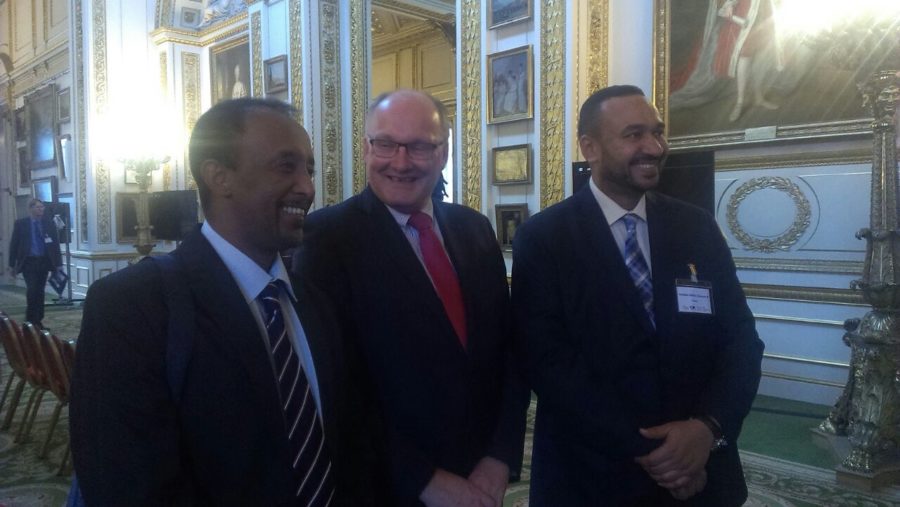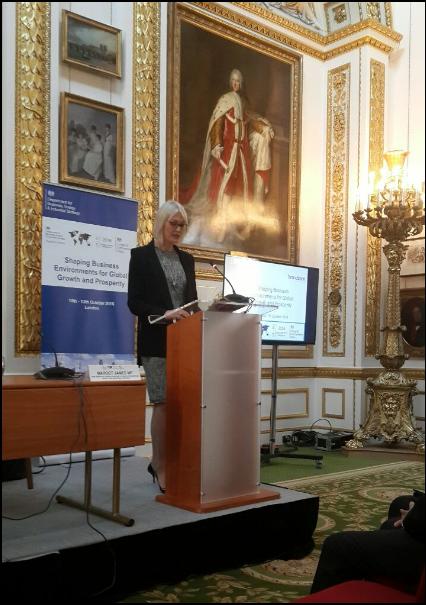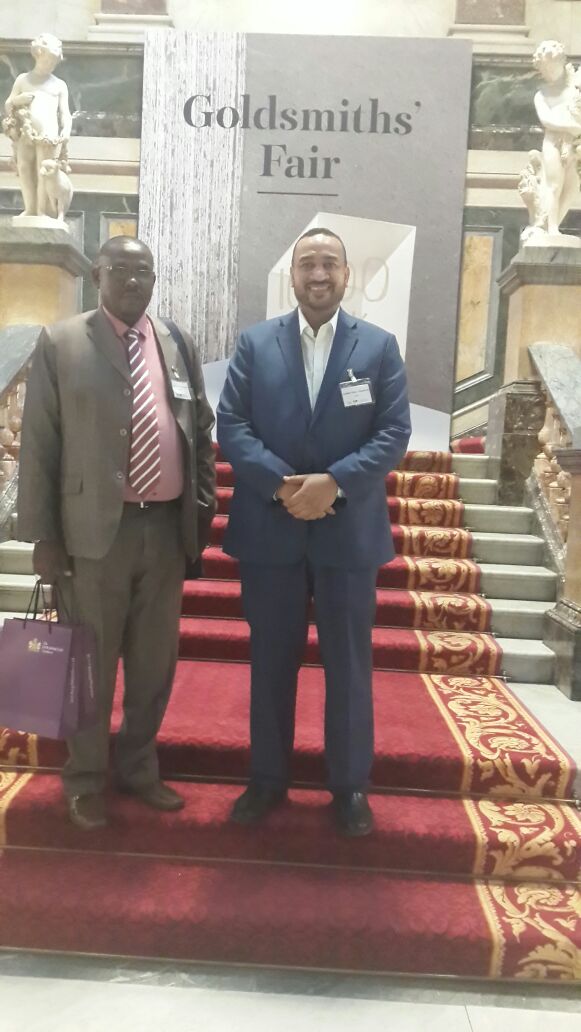3rd November 2016 Khartoum
Doing business in Sudan: thoughts from the Sudanese state minister of investment

Last month, we received an invitation at the Sudanese Ministry of Investment from the UK Department for Business Innovation and Skills to attend a business conference at Lancaster House, London, which was commissioned in 1825. The conference was about ‘Shaping Business Environments for Global Growth and Prosperity’. I attended this conference and I am delighted for this opportunity to talk about our experience.
The conference which took place on 11th – 13th October was set up to look closely at the indicators of ease of doing business and how the global business environment can be shaped to allow for growth and prosperity. With the participation of over 50 countries, it was an excellent opportunity to network.

Upon receiving the invitation we decided to use this opportunity to develop our young talents to give them a chance to experience global business and learn about the global business environment. Therefore accompanying me to the London conference were Tahir Abdul Rahim Mohamed Washi, Head of General Directorate of Financial & Administrative Affairs and one of the newcomers to the Ministry, and Sara Abdelgayoum Ali, from the secretariat of the Doing Business committee. Both of them were very much delighted.
Although it wasn’t possible to arrange for bilateral meetings at the conference I had the chance to meet and speak briefly with the UK Minister of Investment who was very welcoming. The conference provided more than lectures and presentations. The conference workshops also highlighted many themes such as Strengthening capacity through regulatory delivery, International Standards, Trade Facilitation, Transparency and results measurements and also Good Regulatory Practice. It was a fantastic opportunity to network internationally as a number of social events, like the welcoming reception which took place in the Museum of “Brands, Packaging and Advertising”, the cruise down the River Thames and also the Walkie-Talkie Building’s reception, were organised to give delegates a chance to meet informally. We met delegations from Ethiopia, Somalia, Indonesia, Ghana, Uganda, different delegations with different statuses. It was a good chance to meet and discuss with them our bilateral business and cooperation.
Another interesting highlight of this trip were the Study Visits, giving a chance to see the impact of good regulatory delivery on UK businesses, for example, Protection of precious metals was in particular relevant to us in Sudan. We visited the very nice building of the Goldsmiths’ Company, and saw the Assay Office where hallmarking began over 700 years ago. The Goldsmiths’ Hall itself is a world famous Grade 1 listed building where currencies are stamped. There we met several business people working in the gold trade who shared their experience with us. The visit was part of a programme on standards and metrology and it soon became clear that this can also be a good experience for Sudan to combat smuggling. I took their business cards as they expressed their readiness to export their experience to Sudan and I think this is something that we can definitely address as part of the Sudan-UK Strategic Dialogue.

Minister Osama Faisal and Mr. Altahir at the Goldsmith Company building
Many discussions took place on trade, business and investment climate. I found the Doing Business one in particular the most interesting as I was recently appointed to head the higher technical committee for doing business at the Ministry of Investment so it matched my interest and was a chance to learn more about the area.
In setting up the Doing Business committee in Sudan, I believe we’re writing history. I have yet to see another country that forms a doing business committee headed by the first Vice President himself. So for us in the Sudanese Ministry of Investment this is very encouraging and means there is great attention for business and investment in Sudan.
Doing Business is the focus of our work for the next year. It is an area of mutual interest for us and our counterparts in London as we both strive to achieve what the conference had set out to: shaping our business environment for global growth and prosperity.
An important feature of this year’s conference is to provide delegates with the space and time to update peers on specific initiatives and examples of good regulatory practice happening across the globe right now.
Attracting investors
We are aware that right now, and in order to make Sudan attractive for investors, a number of steps need to be taken. One of the main things is to work on infrastructure that investors need, e.g. water. Another thing is working on easing the procedures of doing business in Sudan, which is what we are currently doing in the Ministry of Investment. We are now trying to implement a new IT technology in the ministry to smooth procedures and enable investors to follow their businesses online from UK or any other country without having to be physically in Sudan.
We are also planning to engage with private sectors worldwide and use different methods to promote new business opportunities. This is something we want to discuss bilaterally in the British-Sudanese Strategic Dialogue and explore how we can improve trade between our two nations. There are very big opportunities in Sudan for British business, starting from food security, mining to certain areas like oil – and we would be delighted to see Shell back in Sudan and learn from their experience, and of course if they are back in Sudan we will see other service companies in oil and gas also return to Sudan.
Future Prospects for UK-Sudan relations
I can see very big opportunities for business friends in UK to work in Sudan just as I can see opportunities for some of our Sudanese business people to work in the UK.
The Sudanese are very familiar with British technology and its reliability. There are opportunities for companies starting from consultancy companies up to machinery, agriculture and livestock. Many Sudanese have travelled to the UK for health and education; again these are areas where we can establish joint ventures between private sectors in UK and Sudan to create these institutions here, whether hospitals, clinics, medical laboratories, or universities.
What we need from the UK now is more engagement, to open more doors to engage more with different Sudanese stakeholders: whether they are in business or politics, and when you have the political support the business, investment and traders will naturally follow. We always knew that UK and Sudan know each other very well. Sudanese travel to UK a lot and the UK knows Sudan better than any other country in the world. They have been here. There is a chance for the UK technology and UK businesses to enter Sudan easier than that of any other country, and many of our younger generations are graduates of British universities which will provide a workforce for British companies in Sudan.
I would like to thank you again for hosting me on the blog. This conference was a step forward. It is the first time in almost fifteen years that the ministry of investment received an official invitation for a business conference. It is great that we are now in a position where Sudan and the UK are having constructive conversations in an open and trusting environment. We’re looking forward to strengthening our relations and we are intending to invite our counterpart minister to come and visit Sudan, to get to know the business environment more closely, address our private sector and to tell us more about how we can cooperate with the different institutions back in Britain.

Assalamuvallikum, I am Nawab jan, My brother wants to Start Import and Export. Businesses with. Some Sudani Buyer. Please Send Details. nawabjan22041974@gmail.com.
Dear Mr Osama Faisal
Am from Ludhiana- Punjab-India. I am thinking of Business in Sudan.( Commerce / trading or manufacturing) Am just taking review of Security concern & Sudan Govt help in starting a business.
Dear Prahlad,
Im representing one of the most growing business conslting firms in sudan,our resources and capabilities has been formulated to address your concerns and more.
Please feel free to email us and begin your joureny to discover the opportunities that lies a head.
Ghassan@advacons.com
I would like to point out the summary of Sudan’s 2015 human rights situation as made by the Foreign and Commonwealth Office.
‘ongoing conflicts in Darfur, South Kordofan and
Blue Nile continued, with human rights violations/ abuses and
international humanitarian law violations by all parties – the
majority by the government of Sudan. Humanitarian access
continued to be severely restricted, and aerial bombardments
by government forces continued. By the end of 2015, there
were over 100,000 newly displaced people in Darfur and 3.2
million long-term displaced nationwide.’
I understand that Sudanese are the fifth-largest group of those coming to the UK to claim asylum.
I would hope that there was a consistent approach by the British Government which takes into account these realities. I don’t think that this blog should be a place for the Government of Sudan, nor do I think that this is a time for such engagement by the British Government with the Sudanese Regime which I understand spends three-quarters of its budget on security.
I was expecting talks about investments in basic infrastructure in health , education, and industry rather than ignoring the systemic destrcution of the public sectors in Sudan e.g. Gezira agricultural scheme, sudan airways, national railways. FCO must support the wellfare of the people of Sudan not the current regime. Very disappointing blog.
What kind of investments are you looking for and what kind of business sudanese government want to do to sudanese people?this government is killing people of Sudan using all kinds of weapons people are dying of hunger because all the inestments is going to the coruppted islamists gang they live in luggery and the majorty suffers there is no human rights and the prisons are full of activists sudanese doctors strike is on now and more than 20 leaders are detained and torture wihout any trial and no one knows where they kept and you guys talking about investment .last week this government announce its economic new regulations which is a complete disaster to sudanese people and now they looking to attract investment for more coruppotion more stealing and more terrorest funding and fulling war which kills childern in nuba mountain and blue nile
Based on the principle of cooperation between nations and equal sharing of mutual benefits, I strongly support the start- up of dialogue on Economic relationship between Sudan and the UK. I do wish his excellency Minister Osama Faisal all the best in his job, now and there after.
However, the current situation in Sudan is not conducive to doing business on fair and equitable basis. Considering the new Sudan with its borders after separation of South Sudan, the country is in crisis caused by more than 30 years of war, insecurity, mass internal displacement, gross violations of human rights at the scale of genocide, corruption, human trafficking, refugees , collapse of major Economic infrastructure and acute macro-economic problems.
Business in the form of foreign direct investment, FDI, between Sudan and the UK is going to face many risks, including further human rights violations that will be indirectly supported by the UK business if the UK Government go a head with this project blind folded.
In my opinion I believe a Comprehensive policy framework is needed that address the following:
1) Urge the Sudanese Government and other warring parties to reconcile their conflict through political negotiations that address the root causes of the conflict in the affected areas.
2) Help solve the issues of mass internal displacement by rehabilitation conflict zones where displaced people will return to.
3) Focus on rehabilitation of Sudan Economic infrastructure, such as Sudan railways, Sudan Shipping and airlines, Gezira Agricultural Scheme and Mechanized Farming Schemes in Northern, Eastern Sudan and in South Kordofan and improving higher education institutions. These infrastructures have in the past contributed to providing secured employment for Sudanese and people from all neighbouring countries. This is the only practical way to stop refugees crossing borders from Sudan and its neighbours to other countries in Europe, in particular.
4) A policy framework work and international standards are much needed for fair and equitable investment, particularly in gold mining and Oil & Gas Industries. As I write, there have been widespread safely violations and international standards violations by local gold mining companies that put the lives of people and the whole environment at risk across South Kordofan, which is a great potential for future investment between Sudan and the UK. Local indigenous people have to be informed, consulted, compensated and should be adequately trained to participate in and share the benefits of resources extracted from their lands. Today there is mistrust among the people, and you need to get them trust you first by doing something positive. Stop all forms of dangerous mining and assure the people to get their trust back.
Really nice to have such wellspoken , presentable & wonderful person like Mr Osama as state minister of Investment of Sudan, i think thos visit would be a great an opportunity for both sides to develop business relationships between the two countries.. all the best
Such conferences allow to exchange experiences and ideas, and create a opportunities for various business in Sudan. Thank you ,Mr ambassador .
Good Luck Mr Osama .
As a Sudanese citizen, I am looking forward to seeing strong business and investment relationships between the two governments of the Sudan and UK which will have its positive results on the people of the two nations far from egoism and selfishness.